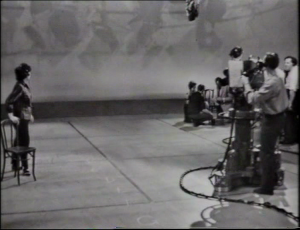by OLIVER WAKE
Studio 4 Adapted and translated by: Rudolph Cartier; From: Erwin Sylvanus (play); Director: Rudolph Cartier
Doctor Korczak and the Children is one of the most unusual and compelling television plays of the 1960s.1 Its subject is tragic and fascinating, while the production itself is interesting in its own right for a myriad of reasons. The extremity of its rejection of naturalistic television drama conventions is startling and it remains an almost unique surviving example of a period of such experimentation at the BBC at the beginning of 1960s. It also illustrates how the reach of a stage text can be expanded to whole new audiences with sympathetic translation into the new medium. This article aims to give an overview of this extraordinary production and its reception by its audience.
Studio 4: ‘Doctor Korczak and the Children’, BBC, tx. 13 August 1962. ↩

